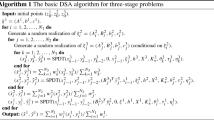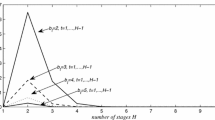Abstract
This work deals with the approximation of convex stochastic multistage programs allowing prices and demand to be stochastic with compact support. Based on earlier results, sequences of barycentric scenario trees with associated probability trees are derived for minorizing and majorizing the given problem. Error bounds for the optimal policies of the approximate problem and duality analysis with respect to the stochastic data determine the scenarios which improve the approximation. Convergence of the approximate solutions is proven under the stated assumptions. Preliminary computational results are outlined.
Similar content being viewed by others
References
J. Birge, “Decomposition and partitioning methods for multi-stage stochastic linear programs”,Operations Research 33 (1985) 989–1007.
J. birge, “An L-shaped computer code for multi-stage stochastic linear programs,” in: Y. Ermoliev and R.J.-B. Wets, eds.,Numerical Techniques for Stochastic Optimization (Springer, Berlin, 1988) pp. 255–266.
J. Birge, “The relationship between the L-shaped method and dual basis factorization for stochastic linear programming”, in: Y. Ermoliev and R.J.-B. Wets, eds.,Numerical Techniques for Stochastic Optimization (Springer, Berlin, 1988) pp. 267–272.
J. Birge and R.J.-B. Wets, “Designing approximation schemes for stochastic optimization problems, in particular for stochastic programs with recourse”,Mathematical Programming Study 27 (1986) 54–102.
J. Birge and R.J.-B. Wets, “Computing bounds for stochastic programming problems by means of a generalized moment problem”,Mathematics of Operations Research 12 (1987) 149–162.
J. Birge and R.J.-B. Wets, eds.,Stochastic Programming, Part I, II, Proceedings of the 5th International Conference on Stochastic Programming, Ann Arbor, MI, August 13–18 (1989);Annals of Operations Research 30, 31 (1991).
G.B. Dantzig and P.W. Glynn “Parallel processors for planning under uncertainty”,Annals of Operations Research 22 (1990) 1–21.
G.B. Dantzig and G. Infanger, “Multistage stochastic linear programs for portfolio optimization,” Technical Report SOL 91-11, Stanford University (1991).
M.A.H. Dempster, ed.,Stochastic Programming, Proceedings of the 1st International Conference on Stochastic Programming, Oxford (1974), (Academic Press, New York, 1980).
M.A.H. Dempster, “Introduction to stochastic programming,” in: M.A.H. Dempster, ed.,Stochastic Programming (Academic Press, New York, 1980) pp. 3–59.
M.A.H. Dempster, “The expected value of perfect information in the optimal evolution of stochastic systems,” in: M. Arato, D. Vermes and A.V. Balakrishnan, eds.,Stochastic Differential Systems, Lecture Notes in Control and Information Sciences (1981) pp. 25–40.
M.A.H. Dempster, “On stochastic programming II: Dynamic problems under risk”,Stochastics 25 (1988) 15–42.
N.C.P. Edirisinghe and W.T. Ziemba, “Bounds for two-stage stochastic programs with fixed recourse,Mathematics of Operations Research 19 (2) (1994) 292–313.
N.C.P. Edirisinghe and W.T. Ziemba, “Bounding the expectation of a saddle function with application to stochastic programming”,Mathematics of Operations Research 19 (2) (1994) 314–340.
Y. Ermoliev and R.J.-B. Wets,Numerical Techniques for Stochastic Optimization (Springer, Berlin, 1988).
K. Frauendorfer, “Solving SLP recourse problems with arbitrary multivariate distributions—The dependent case,”Mathematics of Operations Research 13 (3) (1988) 377–394.
K. Frauendorfer,Stochastic Two-stage Programming, Lecture Notes in Economics and Mathematical Systems, Vol. 392 (Springer, Berlin, 1992).
K. Frauendorfer, “Multistage stochastic programming: Error analysis for the convex case”,Mathematical Methods of Operations Research 39 (1) (1994) 93–122.
K. Frauendorfer, “Stochastic dynamic optimization: Modelling and methodological aspects,” Working Paper, University of St. Gallen (1994).
K. Frauendorfer and P. Kall, “A solution method for SLP recourse problems with arbitrary distributions—The independent case”,Problems of Control and Information Theory 17 (1988) 177–205.
H.I. Gassmann, “MSLiP: A computer code for the multistage stochastic linear programming problem,”Mathematical Programming 47 (1990) 407–423.
O. Hemandez-Lerma and W.J. Runggaldier, “Monotone approximations for convex stochastic control problems,Journal of Estimation, Control and Systems, to appear.
C. Huang, W.T. Ziemba and A. Ben-Tal, “Bounds on the expectation of a convex function of a random variable: With application to stochastic programming”,Operations Research 25 (1977) 315–325.
G. Infanger,Planning under Uncertainty—Solving Large-scale Stochastic Linear Programs (Boyd & Fraser, New York, 1994).
P. Kall, “Stochastic programming with recourse: Upper bound and moment problems—A review,” in: J. Guddat, B. Bank, H. Hollatz, P. Kall, D. Klatte, B. Kummer, K. Lommatsch, K. Tammer, M. Vlach and K. Zimmermann, eds.,Advances in Mathematical Optimization (Akademie Verlag, Berlin, 1988) pp. 86–103.
P. Kall, A. Ruszczynski and K. Frauendorfer, “Approximation techniques in stochastic programming”, in: Y. Ermoliev and R.J.-B. Wets, eds.,Numerical Techniques for Stochastic Optimization (Springer, Berlin, 1988) pp. 33–64.
P. Kall and S.W. Wallace,Stochastic Programming (Wiley, Chichester, 1994).
M. Loève,Probability Theory (1963).
F.V. Louveaux, “A solution method for multistage stochastic programs, with recourse with application to an energy investment problem”,Operations Research 28 (4) (1980) 889–902.
F.V. Louveaux, “Multistage stochastic programs with block-separable recourse”,Mathematical Programming Study 28 (1986) 48–62.
J.M. Mulvey and H. Vladimirou, “Solving multistage stochastic networks: An application of scenario aggregation”,Networks 21 (6) (1991) 619–643.
J.M. Mulvey and H. Vladimirou, “Applying the progressive hedging algorithm to stochastic generalized networks”, in: J. Birge and R.J.-B. Wets, eds.,Stochastic Programming, Part II; Annals of Operations Research 31 (1991) 399–424.
J.M. Mulvey and H. Vladimirou, “Stochastic network programming for financial planning problems,” Department of Civil Engineering and Operations Research, Princeton University (1992);Management Science 38 (1992) 1642–1664.
M.C. Noel and Y. Smeers, “Nested Decomposition of multistage nonlinear programs with recourse”,Mathematical Programming 37 (1987) 131–152.
P. Olsen, “When is a multistage stochastic programming well-defined?”,SIAM Journal on Control and Optimization 14 (3) (1976) 518–527.
S.M. Robinson, “Extended scenario analysis”, in: J. Birge and R.J.-B. Wets, eds.,Stochastic Programming, Part II; Annals of Operations Research 31 (1991) 385–398.
R.T. Rockafellar,Convex Analysis (Princeton University Press, Princeton, NJ, 1970).
R.T. Rockafellar, “Integral functionals, normal integrand and measurable selections”, in:Nonlinear Operators and the Calculus of Variations, Lecture Notes in Mathematics, Vol. 543, (Springer, Berlin, 1976) pp. 157–207.
R.T. Rockafellar and R.J.-B. Wets, “Nonanticipativity andL 1-martingales in stochastic optimization problems”,Mathematical Programming Study 6 (1976) 170–187.
R.T. Rockafellar and R.J.-B. Wets, “The optimal recourse problem in discrete time:L 1-multipliers for inequality constraints”,SIAM Journal on Control and Optimization 16 (1) (1978) 16–36.
R.T. Rockafellar and R.J.-B. Wets, “Scenarios and policy aggregation in optimization under uncertainty”,Mathematics of Operations Research 16 (1991) 119–147.
A. Rusczyński, “Parallel decomposition of multistage stochastic programming problems”,Mathematical Programming 58 (2) (1993) 201–228.
H. Vladimirou, “Stochastic networks: Solution methods and applications in financial planning”, HD Thesis, Department of Civil Engineering and Operations Research, Princeton University (1990).
R.J.-B. Wets, “Stochastic programming: Solution techniques and approximation schemes”, in: A. Bachem, M. Grötschel and B. Korte, eds.,Mathematical Programming, The State of the Art (Springer, Berlin, 1983), pp. 566–603.
R.J.-B. Wets, “Large-scale linear programming techniques in stochastic programming”, in: Y. Ermoliev and R.J.-B. Wets, eds.,Numerical Techniques for Stochastic Optimization, (Springer, Berlin, 1988) pp. 65–94.
R.J.-B. Wets, “The aggregation principle in scenario analysis and stochastic optimization”, in: S. Wallace, ed.,Algorithms and Model Formulations in Mathematical Programming (Springer, Berlin);NATO ASI 51 (1989) 91–113.
Author information
Authors and Affiliations
Additional information
This work has been supported by Schweizerischen Nationalfonds Grant Nr. 21-39 575.93.
Rights and permissions
About this article
Cite this article
Frauendorfer, K. Barycentric scenario trees in convex multistage stochastic programming. Mathematical Programming 75, 277–293 (1996). https://doi.org/10.1007/BF02592156
Received:
Issue Date:
DOI: https://doi.org/10.1007/BF02592156




